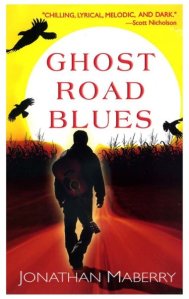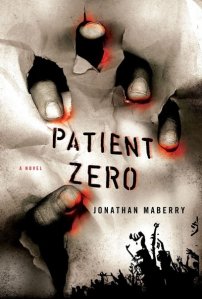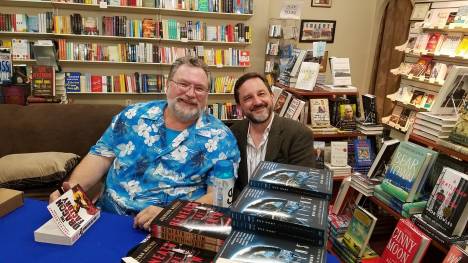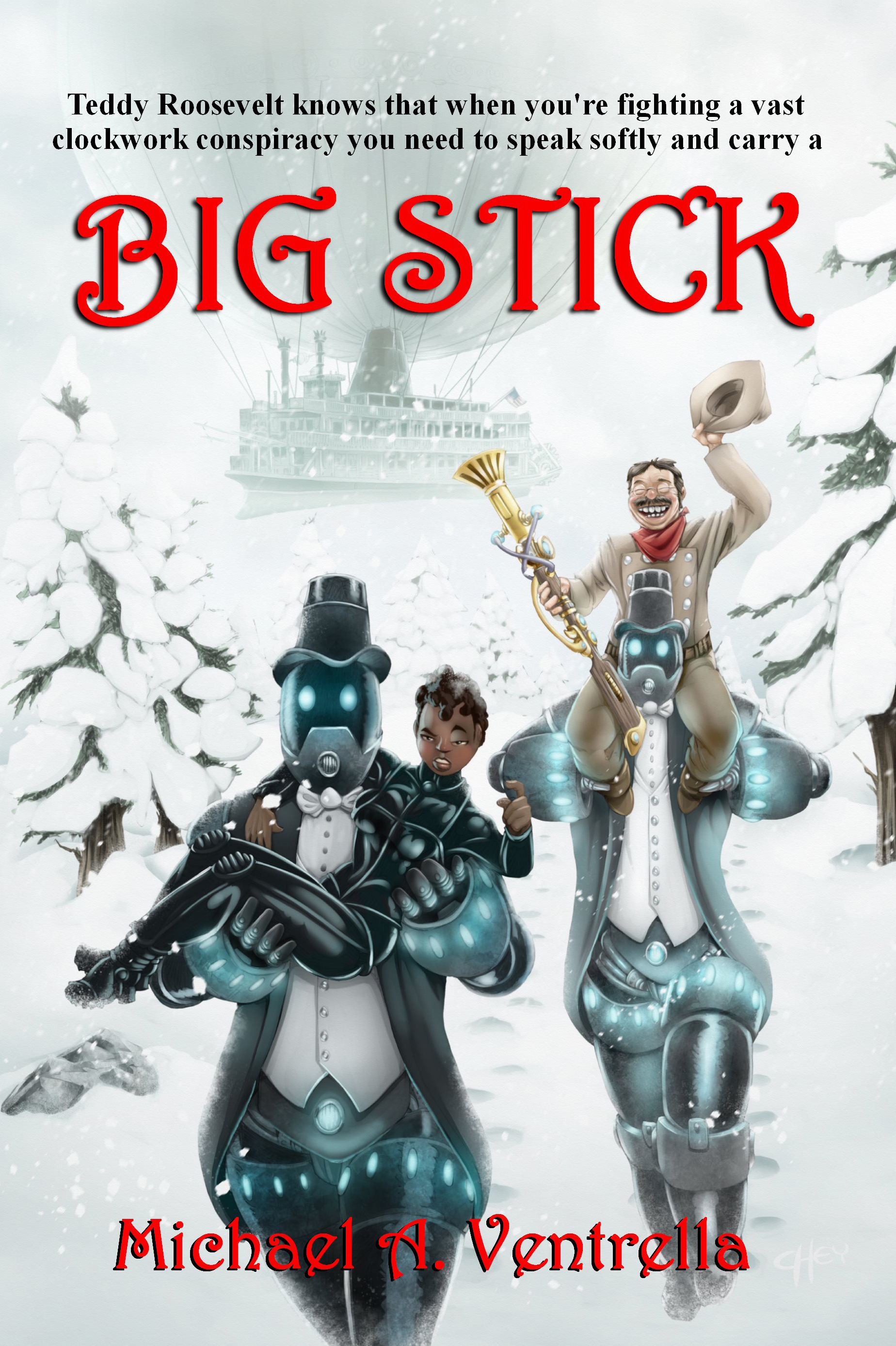JONATHAN MABERRY is the multiple Bram Stoker Award-winning author of novels (PATIENT ZERO, GHOST ROAD BLUES, etc.), nonfiction books (ZOMBIE CSU, THE CRYPTOPEDIA, etc.), comics (BLACK PANTHER, PUNISHER: NAKED KILL and WOLVERINE: GHOSTS), and over 1100 magazine articles. Jonathan is the co-creator (with Laura Schrock) of ON THE SLAB, an entertainment news show for ABC Disney / Stage 9, to be released on the Internet in 2009. Jonathan is a Contributing Editor for The Big Thrill (the newsletter of the International Thriller Writers), and is a member of SFWA, MWA and HWA.
Visit his website at www.jonathanmaberry.com or on Facebook and MySpace

MICHAEL A. VENTRELLA: Jonathan, thank you for being the first to submit to the interrogation, which I promise will be free from “enhanced techniques.” To begin, can you discuss how and why you made the transition from non-fiction to fiction?
JONATHAN MABERRY: I was doing research for a vampire folklore book –VAMPIRE UNIVERSE (Citadel Press, 2006) and realized that popular fiction rarely mines the richness of folklore for source material. Most takes on vampires are variations of Dracula, and Bram Stoker was by no means a folklorist. His vampires different considerably from most European vampires, and even from Transylvanian vampires. There are hundreds of different kinds of vampires in world myth and few of them every appear in fiction.
I thought how interesting it would be to read a novel in which the characters realize they’re up against vampires but everything they try fails because all they know about vampires comes from novels and movies. The more I thought about how much fun a book like that would be, the more I wanted to see if I could write it myself. My only previous attempts at fiction had been a couple of shorts stories way back when that sold to magazines that pay only in contributor copies. But…I decided to give it a shot anyway.
When I set about it, I was consciously writing the kind of book I wanted to read. I had no expectations of it actually selling. After I had the book roughed out I realized that it was a much larger story than I thought and it would have to be a trilogy. That really stacked things against me because until then there had been no horror trilogies.
I went through the process of scouting for an agent, got the book into her hands, and she was able to place it –and the two other as-yet-unwritten books—with a major house. That book, GHOST ROAD BLUES, was published as a paperback original by Pinnacle Books in 2006 and went on to win the Bram Stoker Award for Best First Novel and was in the running against Stephen King and Tom Piccirilli for Novel of the Year. As you can imagine that was a pretty strong dose of validation.
And, just writing the book gave me the bug. Now I’m totally hooked on writing fiction and am work (simultaneously) on my 8th and 9th novels, one for St. Martins Griffin and one for Simon & Schuster.

VENTRELLA: You have also not limited yourself in your writing, having produced novels, short stories, plays, and comic book scripts. Do you advise a starting writer to concentrate in one area first?
MABERRY: Always start with your strength. I started with magazine feature writing about martial arts. I’ve been practicing jujutsu since I was a kid, so when I pitched my first article at age twenty I was able to speak with some authority. From there I went to how-to pieces, and later I wrote martial arts textbooks while teaching Martial Arts History, Jujutsu and Women’s Self-Defense at Temple University. Once I had myself established as a writer I went outside my comfort zone and started pitching on what I liked.
This doesn’t always apply to fiction, though. If I was just starting out now, with no writing credentials, I’d probably tackle a novel in the genre that I read most. Knowledge of your favorite genre –its history, its greatest works, its best writers—creates a comfort zone that lends authority, confidence and passion to your own work.
VENTRELLA: What’s the biggest mistake you made when starting out? What’s the best piece of advice you got?
MABERRY: I made two whoppers. The first was believing that I was skilled enough to represent my own books. That came back to bite me on the ass when I published with a small press owned by a lawyer. Looking back, that had red flags all over it, and I got bent over a barrel. Then I wised up and got an agent. She looks after the legal end of things, and she does a hell of a lot better job of it than I ever did.
The other mistake was believing that old propaganda that creative people are bad at business. Once I got burned by the small press shark, I made sure that I learned everything I could about the writing business. I found that learning the business side of things was just a matter of research, and writers are good at research. It also helped me identify the kinds of people I needed to work with —agents, accountants, etc— and learning how the business works. One of the first things you learn is that publishing IS a business, and everything that occurs within it is part of business. Art is the product, not the method.
VENTRELLA: Your latest series involves Joe Ledger, who works for a top-secret government agency and who has all sorts of advanced training. While it is true that you have a martial arts background yourself, what sort of research did you do to get into the mind of your character?
MABERRY: I talk to pros in the field. Like most writers I love research. I’m a knowledge junkie. I want to know how things work, how people do their jobs, and so on. To get into the head of Joe Ledger I spoke with SWAT operatives and people currently or formerly in Special Ops. Always ask the pros. Find out what makes them tick, what drives them…and find out what they know about their job that Joe Average doesn’t know.
Because of that research I have a strong fanbase among present and former soldiers, cops and agents.
VENTRELLA: Do you think it is better for starting writers to, as they say, “write what you know” and create a main character with the writer’s experience and background?
MABERRY: At first, sure. If you build on your strengths you imbue the character with passion, confidence, and reality. But don’t discount the value of paying attention to people around you. I draw on a lot of people I know, or have known, when creating characters. Rarely is a character made completely from whole-cloth…most have elements of real people.
VENTRELLA: What’s the best way to grab the attention of an agent? What’s the biggest mistake you can make?
MABERRY: Start with things in motion. Don’t lead up to it (that’s a page waster and an interest-killer). I like to jump in and make the characters scramble to catch up to something big and nasty already rolling.
VENTRELLA: Do you have a favorite of your own work? Which, and why?
MABERRY: So far it’s a tie between PATIENT ZERO and the second in the series, THE DRAGON FACTORY. I delivered that a couple of months ago and my editors tell me that it’s better than the first…and they loved the first.
In truth, though, I’m always in love with whatever I’m currently writing.
VENTRELLA: PATIENT ZERO also has the unusual (to me) technique of being written both in the first person and third person, depending on the chapter and the main character’s point of view. How did you decide to adopt this technique and is it being used in the sequels?
MABERRY: It’s a thriller, which means it’s a race against the clock. In most thrillers that have a political or military angle the hero seldom gets to meet the bad guy behind everything. I wanted Joe Ledger to tell his own story, but I wanted the reader to get to know the villains in the piece and learn who they are and why they do what they do. So I switch from first to third. A few other writers do this effectively. John Connolly, Robert Crais, and others. It works well if you stay on top of it and make sure the voice of the first person sections is different than the voice of the third person sections.
VENTRELLA: Just because I want to know: The “zombies” in “Patient Zero” were not supernatural in the traditional sense of the word; will the Ledger novels continue in this vein?
MABERRY: First off…zombies in most fiction aren’t supernatural. In Night of the Living Dead it’s suggested that radiation from a returning space probe caused them to rise. In many other stories they rise as a result of toxic spills, a mishandled bioweapon, or a mutation of some naturally occurring pathogen. My take is that the pathogen is deliberately re-engineered to make a doomsday weapon for reasons that will benefit the villain, a pharmaceutical mogul named Sebastian Gault, who intends to profit from the panic and the resulting rush to create and distribute treatments or cures.
The other books in the series focus on different bio-threats. In THE DRAGON FACTORY, a cabal of scientists are using cutting-edge genetic science to create pathogens for ethnic cleansing and to further the Nazi master race program. In the third book, THE KING OF PLAGUES, a scientist discovers that the Tenth Plague of Egypt –the death of the firstborn from the story of Moses—was actually a pathogen; he recovers it and attempts to weaponize it so he can sell it to terrorists.
I have little faith in the sensible use of extreme science. I like science, but research, profit and morality seldom occur all at once in the same people. To me, that’s far more frightening than zombies!
Filed under: writing | Tagged: Comic book writing, Jonathan Maberry, new writers, Patient Zero, writing advice, zombies |




Good stuff, Michael.
LikeLike
Very cool interview. Thanks!
Beth Fehlbaum, author
Courage in Patience, a story of HOPE
http://courageinpatience.blogspot.com
Ch. 1 is online
LikeLike
Fabulous! Thanks for getting Jonathan online to talk about his work and the biz. Very insightful.
LikeLike